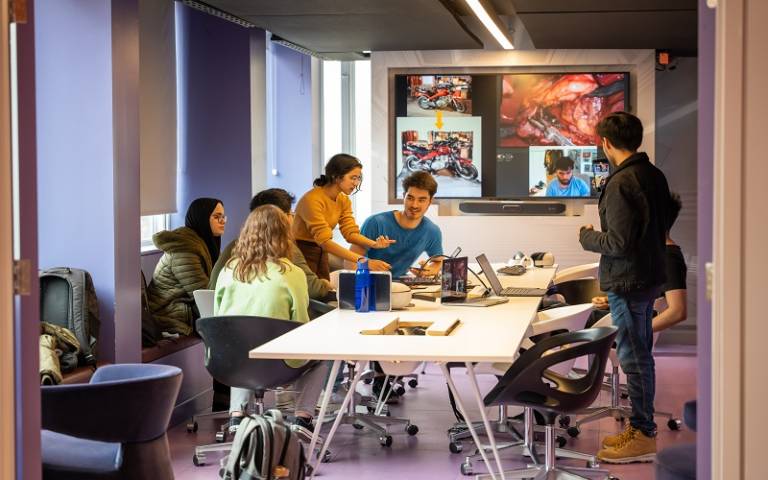A new book highlights collaborative projects between computer science students and the NHS
2 August 2023
UCL Computer Science has published a digital book of over 500 abstracts of student projects. Uniting these projects is a focus on accelerating digital health R&D.

The book lists proofs of concept worked on by students, the health sector and industry since 2015. By showing how technology can address healthcare challenges, the aim is to help prepare the NHS for the future.
The collaborative model brings together students, educators, technology corporations, including Microsoft, IBM, and Intel, and health partners. These health partners number hundreds of hospitals, trusts, charities and companies. Together multidisciplinary teams devise early-stage prototypes that enable the NHS to explore ideas and emerging technologies, with minimal cost and quick turnaround times.
The projects are part of the Industry Exchange Network (IXN) for the NHS programme. On the programme, students work with industry and healthcare mentors, learning new skills and gaining experience that gives them a head start with their careers.
Now adopted by 14 UK universities, IXN for the NHS was launched, and is managed, by the UCL Computer Science department. The UK government’s Topol Review cited the IXN methodology as best practice. The Review sets out recommendations to ensure the NHS is the world leader in using digital technologies to benefit patients.
The abstract book contains diverse projects of varied sizes, including:
- Project Fizzyo, which gamifies physiotherapy for children with Cystic Fibrosis, transforming tedious daily exercises into play.
- UCL HoloRepository, a joint initiative between UCL, Great Ormond Street Hospital (GOSH), Intel and Microsoft, to advance medical imaging.
- UCL MotionInput, touchless computing software conceived during the COVID-19 pandemic to limit hospital staff’s contact with shared computers. It has since proved to have tremendous benefits as an assistive technology.
- PorterBLE, a hospital porter tracking and request system which supports drone delivery in hospitals.
- A project with GOSH’s Paediatric Cancer Dietetic Team to improve access to crucial nutritional information about children undergoing treatment for cancer.
Professor Dean Mohamedally, UCL Computer Science lecturer and co-founder of IXN for the NHS, said:
“We want the NHS to know that the IXN for the NHS is there to support their digital transformation processes and their early R&D projects. There are many challenges for the NHS, whether they are experienced by staff on the ground or at director level. A fundamental attribute of IXN for the NHS is that we provide opportunities to address these varied problems, large or small. The students and our industry partners are committed to developing concepts at a rapid pace in line with NHS endeavours.”
Neil Sebire, Chief Research Information Officer at GOSH and Professor of Pathology at UCL, said:
“Digital innovation in healthcare is at the heart of the GOSH digital strategy. Our engagement with the IXN programme allows our staff to co-develop prototype concepts with the potential to impact delivery of medical care and improve the healthcare experiences of patients and families at GOSH.”
 Close
Close

